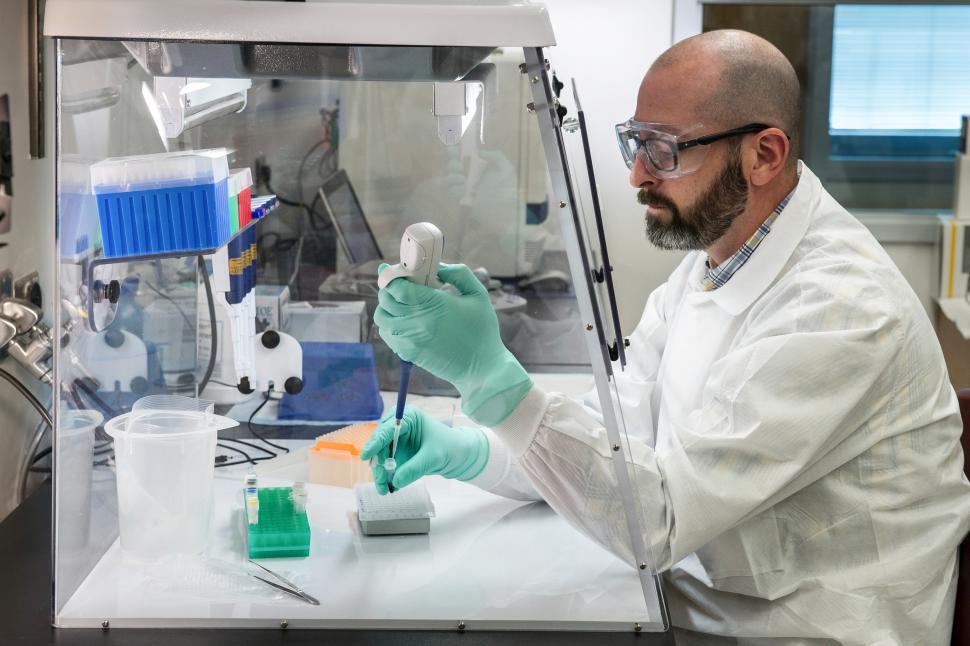CDC Standoff Kennedy Chaos
By Asmita - Aug 28, 2025
The campaign led by Robert F. Kennedy Jr. to oust the director of the C.D.C. has intensified political divisions within the agency. Tensions escalated as Kennedy's criticism of the C.D.C.'s Covid-19 response tactics sparked calls for leadership change. Internal communication breakdowns and fears of an "existential crisis" prompted concerns about the impact on disease surveillance and emergency response programs. The lack of succession planning added chaos, with debates over interim solutions amid worries of undermining the C.D.C.'s scientific mission. Amid speculation of federal intervention, states reviewed protocols to mitigate potential disruptions in public health initiatives. The standoff raised alarms among public health experts about the global implications on pandemic preparedness, emergency planning, and international partnerships.

CDC scientist in lab via Freerange Stock
The recent standoff at the ,[object Object], (C.D.C.) has spiraled into upheaval, as Robert F. Kennedy Jr.’s campaign to oust the sitting director deepens political divides within the agency. Kennedy, a polarizing figure known for his challenging stance on ,[object Object],, initiated the push with a promise of “restoring trust and transparency.” His public criticism of the C.D.C.’s ,[object Object], tactics became the rallying cry for a coalition of lawmakers demanding immediate leadership change. The tensions at the C.D.C. reached a boiling point when Kennedy leveraged congressional hearings to scrutinize the director’s decisions, highlighting alleged communication breakdowns and irregularities in pandemic protocols.
As pressure mounted, internal communication within the C.D.C. broke down, with career scientists and senior officials voicing alarm over what they described as an “existential crisis.” Reports indicate that multiple senior staff considered resigning, fearing the upheaval could compromise ongoing disease surveillance and emergency response programs. While Kennedy’s supporters insist his tough stance was necessary to reform the agency and prevent policy missteps, critics warn that the politicization threatens to undermine public confidence in the country’s leading health institution. Staff testimony at recent internal meetings described an atmosphere of uncertainty, as proposed reforms were met with widespread skepticism and concerns about their potential impact on morale and operations.
Complicating the situation was the lack of clear succession planning should the director be removed, which sowed further chaos among department heads and regional office administrators. Congressional allies of Kennedy lobbied for an interim advisory committee, but critics questioned whether such a temporary solution could maintain the rigor and credibility of the C.D.C.’s scientific mission. During tumultuous meetings, management struggled to assure staff that essential public health initiatives would remain on track, even as rumors emerged of possible federal intervention. The uncertainty led some states to preemptively review protocols for their own health agencies, worried that instability at the federal level could disrupt vaccinations, disease outbreak monitoring, and emergency responses.
Meanwhile, public health experts outside the agency voiced urgent warnings about the broader ramifications of the standoff. News outlets and academic leaders underscored how leadership crises at the C.D.C. could ripple across pandemic preparedness, emergency planning, and international partnerships. Industry insiders described rising anxiety among global health organizations that rely on the C.D.C. for guidance, technical support, and data sharing. With Kennedy’s campaign drawing attention worldwide, foreign governments closely monitored the situation, evaluating contingency plans in case disruptions hindered collaborative efforts on disease detection and response.


